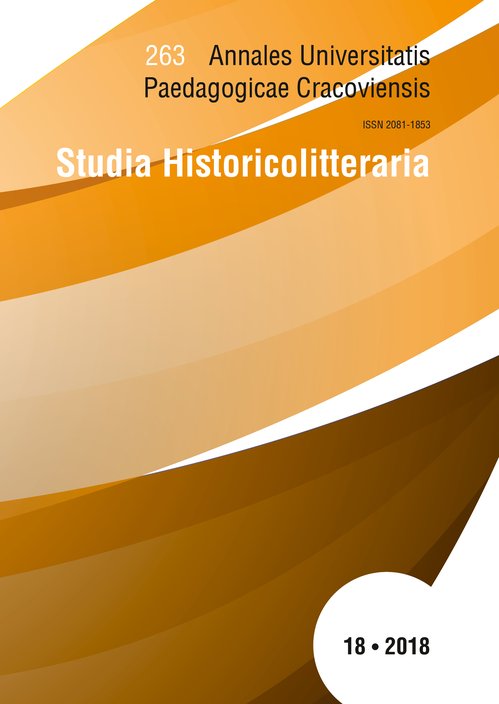Dwa „łzawe” apele Marii Ilnickiej („Do sióstr moich”)
Main Article Content
Аннотация
Maria Ilnicka is directly associated with the Manifesto of 22nd January, 1863. As its (co-) author, she expressed her opionion on emancipation issues both in poetry and ”Bluszcz”, which she edited herself. However, contrary to the expectations resulting from the contents of the Manifesto, these are not revolutionay views. In fact, they are more conservative and in line with the convential status quo. Two poems of the same title: Do sióstr moich, clearly reflect her ideas. Ilnicka emphasises first of all: a passive attitude of women towards national matters, suggesting the model of ‘a mournful weeper’, and second of all: abandoning social activity and remaining in the shadow of patriarchy - in the role of ‘a guardian of the hearth’.
Скачивания
Article Details

Это произведение доступно по лицензии Creative Commons «Attribution-NonCommercial-NoDerivatives» («Атрибуция — Некоммерческое использование — Без производных произведений») 4.0 Всемирная.
ПОЛИТИКА АВТОРСКИХ ПРАВ
Издатель «Annales Universitatis Paedagogicae Cracoviensis. Studia Historicolitteraria» имеет право использования и распространения всех опубликованных в издании материалов на основании договора неограниченной во времени неисключительной лицензии - предварительно заключенного на неоговоренное время с каждым автором конкретного произведения на оговоренных в том договоре условиях использования.
ПОЛИТИКА ОТКРЫТОГО ДОСТУПА
«Annales Universitatis Paedagogicae Cracoviensis. Studia Historicolitteraria» это издание с открытым доступом, а все его содержание доступно бесплатно для пользователей и организаций на основаниях неисключительной лицензии CreativeCommons (CC BY-NC-ND 4.0). Пользователи могут читать, скачивать, копировать, распространять, производить поиск или переходить по ссылкам к полным текстам статей в этом издании без предварительного согласия издателя либо автора при условии указания источника доступа и авторства данной публикации. Это согласуется с определением открытого доступа BOAI (http://www.soros.org/openaccess).
Библиографические ссылки
Bednarz-Grzybek R., Kwestia kobieca. Rodzina – wychowanie – edukacja. Bibliografia adnotowana zawartości czasopisma „Bluszcz” (wybór za lata 1865–1905), Lublin 2016.
Caban W., Kobiety i powstanie styczniowe, [w:] Kobieta i świat polityki. Polska na tle porównawczym w XIX i w początkach XX wieku. Zbiór studiów, red. A. Żarnowska i A. Szwarc, Warszawa 1994.
Dubiecki M., Wspomnienia Matki i Córki z powstania 1863 roku, Emilii Heurichowej i Teodory z Heurichów Kiślańskiej [rec.], „Kwartalnik Historyczny” 1919, t. XXXIII.
Gawin M., Przeciw emancypacji kobiet, „Teksty Drugie” 2011, nr 4.
Górski K., Stanisław Krzemiński. Człowiek i pisarz, Warszawa 1985.
Hulewiczowa M., Ilnicka Maria, [w:] Polski słownik biograficzny, t. X, Wrocław–Warszawa–Kraków 1962–1964.
Ilnicka M., Apolonia Plewińska, „Bluszcz” 1873, nr 3.
Jankowski E., Z różnych sfer. Studia i portrety, Warszawa 1994.
Kotowski R., Popularyzacja aktywności społecznej kobiet na łamach tygodnika „Bluszcz” w latach 1918–1939, [w:] Kobieta i media. Studia z dziejów emancypacji kobiet, red. P. Perkowski, T. Stegner, Gdańsk 2009.
Kobieta w poezji polskiej. Głosy poetów o kobiecie, Warszawa 1907.
Orzeszkowa E., Listy zebrane, oprac. E. Jankowski, t. I, Wrocław 1955.
Paja A., Marii Ilnickiej nienapisana historia literatury dla kobiet, [w:] Historie literatury polskiej 1864–1914, red. U. Kowalczuk, Ł. Książyk, Warszawa 2015, s. 179–190.
Polska w pieśni 1863 r., zebr. i ułoż. S. Lam i A. Brzeg-Piskozub, Lwów 1913.
Skrzypek M., Obraz kobiety-Polki w późnoromantycznej poezji powstania styczniowego, „Prace Naukowe Akademii im. Jana Długosza w Częstochowie. Filologia Polska. Historia i Teoria literatury” 2013, z. 13.
Wawrzykowska-Wierciochowa D., Z umiłowania. Opowieść biograficzna o Wandzie z Wolskich Umińskiej, Lublin 1973.
Zaleski A., Towarzystwo warszawskie. Listy do przyjaciółki przez baronową XYZ, Warszawa 1971.
Zapolska G., W sprawie emancypacji, „Kurier Warszawski” 1889, nr 104 (przedruk: Zapolska G., Publicystyka, oprac. J. Czachowska i E. Korzeniewska, cz. I, Wrocław 1958).
Żmichowska N., Narcyssa i Wanda. Listy Narcyzy Żmichowskiej do Wandy Grabowskiej (Żeleńskiej), wyd. i wstęp T. Boy-Żeleński, Warszawa 1930.
